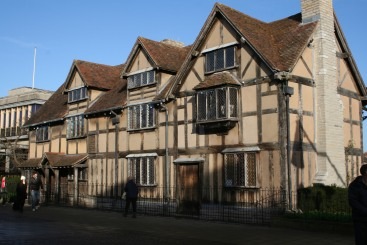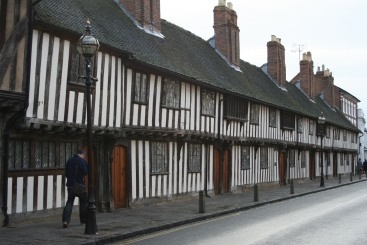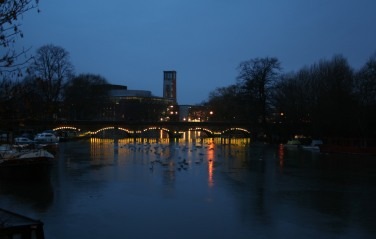 Given my hesitations about “being a tourist” I wasn’t sure if I wanted to visit Stratford-upon-Avon, but I decided that it would be remiss of me to be so close and not make a pilgrimage. Thus it was that I went in search of the Bard.
Given my hesitations about “being a tourist” I wasn’t sure if I wanted to visit Stratford-upon-Avon, but I decided that it would be remiss of me to be so close and not make a pilgrimage. Thus it was that I went in search of the Bard.
I have had a long acquaintance with Shakespeare. One of the more bizarre things about my primary school education was that when I was in Grade 5 we did a condensed version of The Merchant of Venice for the school’s annual concert, and the following year we did Macbeth. (Today I tried to imagine what it might be like going to school in Stratford-upon-Avon: “Excuse me, miss, do we have to do Macbeth again? We did it in Grade 1 and Grade 4!”)
Then, when I was in Grade 9, we did some extracts of Julius Caesar with a teacher too afraid to trust us with much of the reading, so she read virtually all of it herself. I think I met Macbeth again in Year 10, with Roman Polanski’s film version with heads bouncing down the stairs, and in Year 11 I think it might have been Hamlet.
 Since my school days, I have seen various plays, either live or on film, with memorable occasions including a performance of A Midsummer Night’s Dream down an abandoned coalmine in Newfoundland with an audience of about 20, and the fairies in blacklight-painted costumes. I’ve also enjoyed the Kenneth Branagh versions of Henry V and Much Ado About Nothing (and have seen his Hamlet, but by its very nature this one is harder to enjoy, although it is always interesting to see how people interpret it).
Since my school days, I have seen various plays, either live or on film, with memorable occasions including a performance of A Midsummer Night’s Dream down an abandoned coalmine in Newfoundland with an audience of about 20, and the fairies in blacklight-painted costumes. I’ve also enjoyed the Kenneth Branagh versions of Henry V and Much Ado About Nothing (and have seen his Hamlet, but by its very nature this one is harder to enjoy, although it is always interesting to see how people interpret it).
I appreciate well-performed Shakespeare; what strikes me as remarkable is how a good performance can add meaning to some of the obscurer phrases, so that even though you still may not know exactly what they mean you have a much stronger sense of their intent. I have tried “reading” Shakespeare to myself a few times, and I think it’s something that really does have to be done aloud, although it takes me a while to get the rhythm of his language (and often I don’t!). I just love the richness of the text … although I can’t help remembering the joke about the guy who goes to see his first ever Shakespeare play and comes out saying “I don’t see what all the fuss is about with Shakespeare: all he did was string together a bunch of famous quotes”.
 Anyway, having decided to see (rather than not to see), I went the whole hog and did all the Shakespeare houses (apart from his mother’s farm, which is currently closed). I did his birthplace (the first photo), which was actually quite a big house (although it was also his father’s glove-making workshop). One of the more unusual exhibits involved famous vandals: early visitors to the house used to sign their names on the house or scratch them into the window of The Birth Room (it sounded like it was said with initial capitals), and so Sir Walter Scott’s vandalism has been immortalised for all to see.
Anyway, having decided to see (rather than not to see), I went the whole hog and did all the Shakespeare houses (apart from his mother’s farm, which is currently closed). I did his birthplace (the first photo), which was actually quite a big house (although it was also his father’s glove-making workshop). One of the more unusual exhibits involved famous vandals: early visitors to the house used to sign their names on the house or scratch them into the window of The Birth Room (it sounded like it was said with initial capitals), and so Sir Walter Scott’s vandalism has been immortalised for all to see.
The second photo is just a streetscape of some tudor cottages in Stratford-upon-Avon; not far from here you can visit the site of Shakespeare’s big house that he bought following his success in London (and which a later owner knocked down because he was sick of tourists visiting and the grief he was getting from the town council), together with his daughter’s house (she was married to a doctor, and part of the house is devoted to the physicking skills of the time, from which I learned that the 17th century was not a good time to get sick, despite some miraculous claims).
Shakespeare died in Stratford-upon-Avon too, and he is buried inside one of the churches, where there is a stained-glass window that shows the “seven ages of man” (“All the world’s a stage …” from As You Like It), from mewling, puking infant to “oblivion, sans teeth, sans eyes, sans taste, sans everything”. Anyway, it’s a bit hard to see it all in the photo, but there was a guide at the church who highlighted all the features of the window and related them to the quote (and in case you are wondering how seven ages gets fitted into eight windows, the sixth stage occupies the top two middle windows).
About a mile out of town you can visit Anne Hathaway’s cottage (she became Shakespeare’s wife), with its thatched roof and archetypal Tudor framed wattle and daub construction, as shown below. The up-side of visiting in December is that there are very few tourists about (although there was a busload of Asian tourists at Shakespeare’s birthplace who, fortunately, were doing a speedy-Gonzales tour and thus overtook me and disappeared); the down-side is that the reputedly pretty gardens are dormant and denuded.


 I nearly forgot to take a photo of the Avon, and since it was an hour after mid-afternoon when I remembered you can’t see very much of it apart from the light reflections. There is a two-hour hiatus between trains from Stratford-upon-Avon, and so I had a bit of time to kill after I’d done the houses (the Royal Shakespeare Company was doing an evening performance but it wasn’t Shakespeare and I wouldn’t have been able to get home afterwards, so I gave that option a miss). Consequently I did a little “night” caching in the light rain (it is so weird having it late-night black at only 4:30pm). I managed to find a few, and took a photo of the Christmas lights in the town centre.
I nearly forgot to take a photo of the Avon, and since it was an hour after mid-afternoon when I remembered you can’t see very much of it apart from the light reflections. There is a two-hour hiatus between trains from Stratford-upon-Avon, and so I had a bit of time to kill after I’d done the houses (the Royal Shakespeare Company was doing an evening performance but it wasn’t Shakespeare and I wouldn’t have been able to get home afterwards, so I gave that option a miss). Consequently I did a little “night” caching in the light rain (it is so weird having it late-night black at only 4:30pm). I managed to find a few, and took a photo of the Christmas lights in the town centre.
On the way back to Oxford in the train I reviewed a paper. It wasn’t very good, and I amused myself by imagining a review written in a style parodying Shakespeare (badly): “Thy tedious graphs haunt the dreams of a repose induced by thy numbing repetitions. Thy claims of mighty distinctions among the serried ranks of thy participants drift away as zephyr-snatched gossamer and all my hopes for piercing clarity fade and blur beneath the limpid lens of thy unfocused analysis.”
Shakespeare does it better (although rather stronger than fairly ought to be applied in this case): “It is a tale, told by an idiot, full of sound and fury, signifying nothing”! He was the master of the insult, was Bill, and you can actually get a souvenir Shakespeare-insult-a-day calendar. I suppose I had better behave myself and write a proper polite and constructive review but not right now because I have blathered here far too long and late.
“Men of few words are the best men” (Henry V). 🙁 🙂
 Helen Chick
Helen Chick
Cool! I would like to see the window.
I am reminded that I’ve seen “wattle and daub” spelled as “waddle and dob.” *shudder*
How about A Midsummer Night’s Dream with Robots?!?
http://www.wired.com/autopia/2009/11/robots-perform-shakespeare/